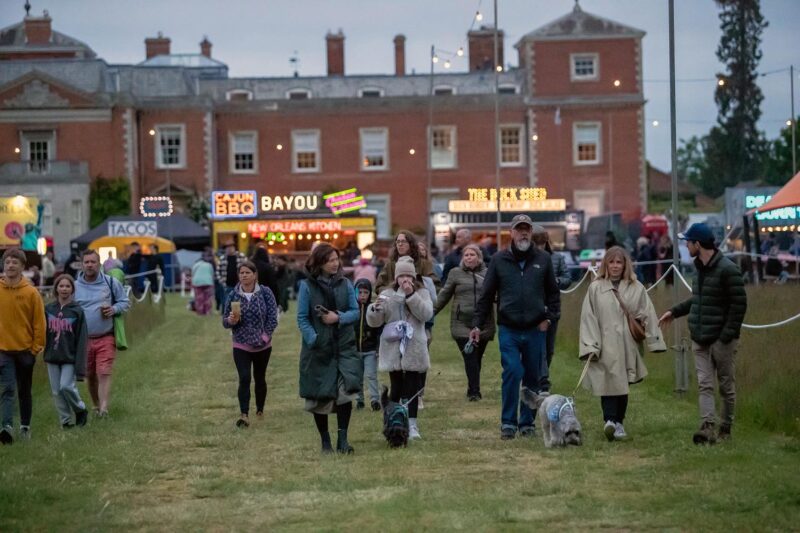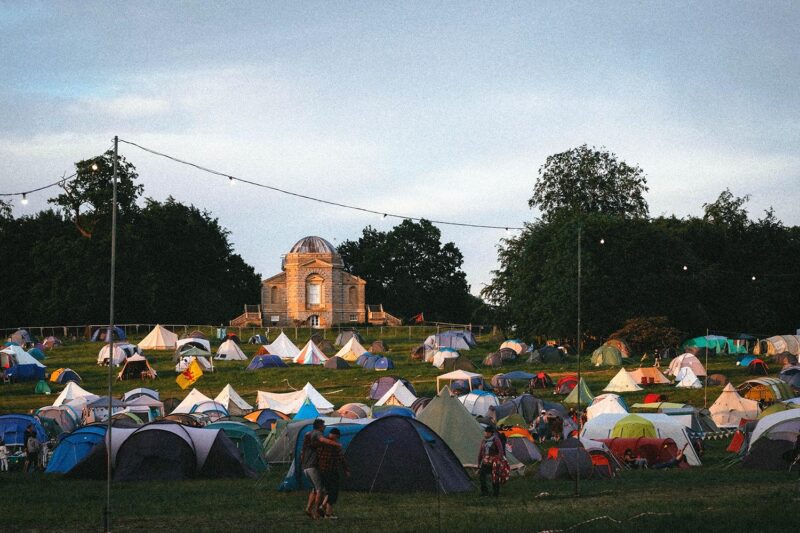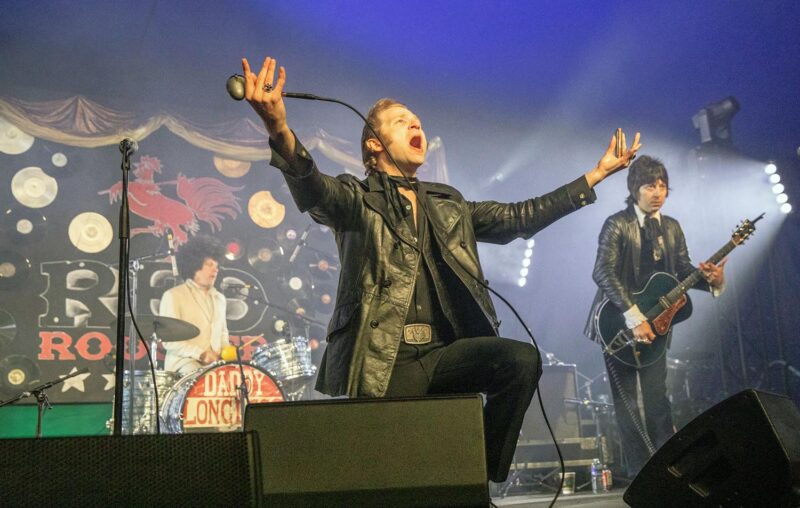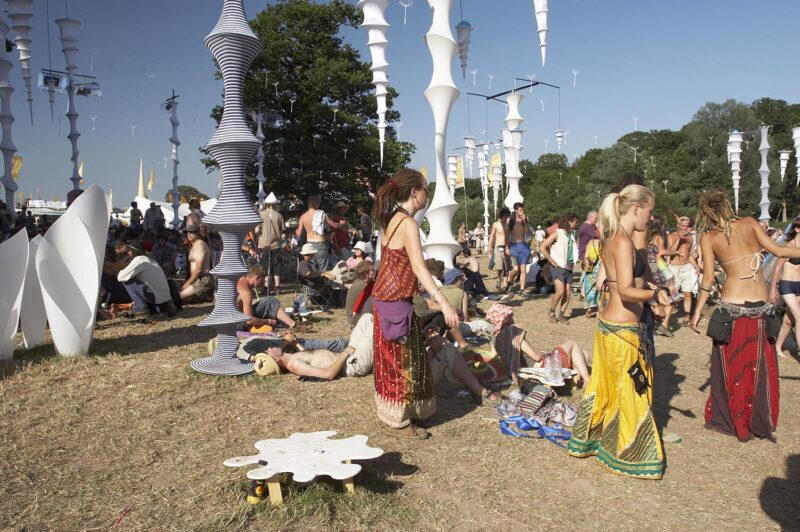
Making merry
Raveonomics
The stately home music festival season is in full swing in the UK. But how—and why—do the landed gentry host rural rave-ups in their country piles?
It’s nearly as synonymous with British summer time as strawberries and cream, Pimms, and the unpredictable weather. Across the country, sprawling private estates are opening their gilded gates to welcome thousands of wellie-boot clad revelers into domains usually reserved for the privileged few.
But what tempts the landed gentry to gamble with the serenity of their thousand-acre realm? Why bet the proverbial “farm” on a music event that risks infuriating the neighbors? Are the smaller boutique affairs profitable, or just passion projects for landowners (and their mischievous offspring)? Well, as it turns out, festivals are risky but can be rewarding if you get them right.
“Most farming estates need more income, it’s that simple,” says Freddie Fellowes, the eldest son of the 4th Baron de Ramsey and founder of the Secret Garden Party, a festival held on his family’s private estate in Cambridgeshire. “If you’ve got beautiful tracks of parkland that can’t be farmed, a music festival is probably a productive way to go.”
Fellowes probably knows what he’s talking about. Secret Garden Party, now in its 15th year, is the UK’s largest independent festival and reportedly turns over millions. Famed for its eclectic line up, paint bombs and naked dancing, the four-day event describes itself as a “hedonistic happening”, where attendees shed all inhibitions as they step beyond the entrance gates.
The multitasking Fellowes wears the hat of both landowner and festival programmer, juggling farm meetings about potato yields while scoring acts like Grandmaster Flash and The Libertines. Sounds like fun. But here’s the million-dollar question: Does an annual knees-up in a 100-acre field make more dough than the 6,000-acre family farm?
“In a good year, yes it does,” Fellowes says. “Festivals are high risk but farming is in a crisis thanks to our beloved government and Brexit, and being able to diversify in this way makes this [the festival site] our most profitable acreage. Put it this way: Without our events business we would be having much tougher conversations with the bank.”


Secret Garden Party will sell around 16,000 tickets this summer, which is an intentionally low number. (It has sold 40,000 tickets in the past—something Fellowes admits was a mistake). Long-term survival depends on not overreaching, he says, referring to how the festival went on a five-year hiatus in 2017 following accusations of selling out.
“We lost control of our brand identity,” he says. “Around 50 percent of our audience knew what we stood for and the rest really didn’t, and I think our popularity overrode how we marketed ourselves. It’s a constant battle to make sure our visibility and success don’t overshadow our core values.”
As a result, Fellowes’ current focus is making the festival better, not bigger. And what energizes him these days is not so much frolicking in the field, but making his business a “virtuous circle.” Secret Garden Party recently adopted a social enterprise model, pledging to allocate over half of its earnings to supporting the arts, marking an exciting new chapter for the festival. “It’s great because I’ve got to the point where I’m basically done with the spreadsheets!” he added.
Fellowes brought Secret Garden Party stateside in 2011. Escape to New York, held in the Hamptons on the Shinnecock Reserve drew a relatively small crowd—and the Sunday had to be cancelled due to “inclement weather”. While he promised E2NY would be back “bigger, better, weirder” that was the festival’s last jaunt overseas. “The simple answer is that my backers stupidly pulled out,” said Fellowes. “This was just before EDM festivals exploded in the US with us holding the rights to hold a festival in the middle of the Hamptons. Doh!”
Blue-Blooded Blues
Henry FitzRoy, the 12th Duke of Grafton, and the creative force behind Red Rooster Festival, says he isn’t particularly driven by profits either. The 45-year-old Duke finds fulfillment in opening up the magnificent gardens of Euston Hall, his family’s 17th-century home in Suffolk, where he shares his love of blues, bbq and bourbon against a breathtaking Capability Brown landscape.
“I want everyone to feel welcome in the grounds,” he says. “Aside from running the farm business, Red Rooster is my passion, and our unique riverscape, wild swimming, butchery classes and parades are what sets us apart.”
For the Duke, who prefers to be called Harry, it’s the music that matters most. He and his team visit Memphis and New Orleans during the off-season to do market research. Their destination? The intimate honky-tonks and dive bars to unearth the hidden gems of blues, country, soul and cajun music. Because of this, Grafton, who worked as a music promoter in Nashville before inheriting his 10,000-acre estate, has the trust of his audience even if they don’t know a single band on the bill.



As for the financials, the Duke explains that he receives a fee for use of the site from Red Rooster’s production company, and a modest share of the profits if the festival performs well. But at this point, he says, Red Rooster has yet to hit the “golden number” of 9,000–10,000 ticket sales, where revenue exceeds expenses (Red Rooster currently gets around 6,500 attendees). However, the Duke remains optimistic that his passion will be profitable one day.
“The best way to approach events is to do a flat rent deal,” he says. “We’ve broken even five times now out of nine and if we’ve made losses, they’ve not been big ones. The key is to stick to a tight budget when it comes to booking the acts—that’s what has prevented us from falling into a pit of debt.”
Luckily, hosting a music festival has other business benefits. For example, Grafton’s estate now has the infrastructure to accommodate all manner of large-scale events requiring running water, sewage, electricity and a reliable internet connection. Consequently, during the off-season, the estate generates income from farming conferences or agricultural trade shows, even if they lack the thrill of a music festival.
“Red Rooster is actually a really useful marketing tool,” he says. “You’ve got to diversify to be successful, and these types of trade events are definitely a tranche of income that didn’t exist before we did the festival.”


Arty Party
It’s a similar-ish motivation for the landlords of Houghton Festival, a four-day dance music extravaganza in the bucolic grounds of Houghton Hall. Although famed for its legendary line-up and bumping beats, one of the festival’s popular extracurricular activities is a free tour of Houghton’s private sculpture garden, which includes pieces by Turner Prize winner Rachel Whiteread, Anish Kapoor and light artist James Turrell.
The Marchioness Cholmondeley, who runs Houghton’s grand estate together with her husband, says the festival definitely contributes to the “overall cost of things”. But perhaps more importantly, it brings a younger crowd to Houghton’s historic house and gardens, boosting its relevancy among future visitors.
“Houghton is now quite well known now among all age groups,” says the 39-year-old Marchioness, known as Rose. “Young people are now now engaging with our contemporary art exhibitions.”



The Grind Behind the Groove
Hosting a major music festival event is no walk in the park. Skyrocketing electricity prices, shortages of things like restroom facilities (many such firms went bust during the pandemic), a cost of living crisis, and complex licensing laws—not to mention 800 other festivals all vying for attendees during the summer season—have converged to create a perfect storm for organizers.
“COVID really put a wrench in the works,” says Grafton. “There was a burst of enthusiasm for live music after lockdown but now most people are short of money, and it’s hard to motivate them to buy tickets.”
That being said, landowners have several advantages over other festival organizers: As well as their rent-free sites, they’re able to invest in infrastructure, roads, sewage works and compostable toilets, and afford to take a long-term view. Most can also marshal an army of tractors and farm laborers in response to a crisis. “When shit hits the fan, we have a lot to throw at it,” says Fellowes.


Needless to say, shit sometimes does hit the fan. Secret Garden Party has had its fair share of toilet trouble, power outages, mud misery and drug-fuelled drama. One year, due to regulatory loopholes, dodgy legal highs were sold at the festival, a situation Fellowes describes as “an absolute nightmare.”
“People were reacting really badly and we didn’t know how to treat them,” he says. “We’ve also had cases of people taking highly concentrated ecstasy tablets and coming close to a very bad ending. We are lucky and proud that that didn’t happen.”
Close calls are something Anselm Guise, founder of the now defunct Glade Festival, knows all about. Guise said how his festival site once experienced the heaviest rainfall ever recorded in England, just one day before opening.
“We had a river running through the central marquee which was five feet deep,” he said. “We went ahead anyway! It was fucking bedlam!”
Drug dramas and freak weather events aside, festival owners past and present agree that the secret to success is sticking to the principles of having fun in a field with friends. Such enthusiasm is infectious and long-lasting. So, if you’re thinking about trying to squeeze a few hundred grand out of your ancestral acres to pay for that hole in the roof, throwing a massive party might be the solution. But it’s probably best to start from a place of peace and love, not the pursuit of profit. Because in the festival business, profit tends to follow the path of passion.
Hero image The Secret Garden Party 2022 by Joshua Atkins



